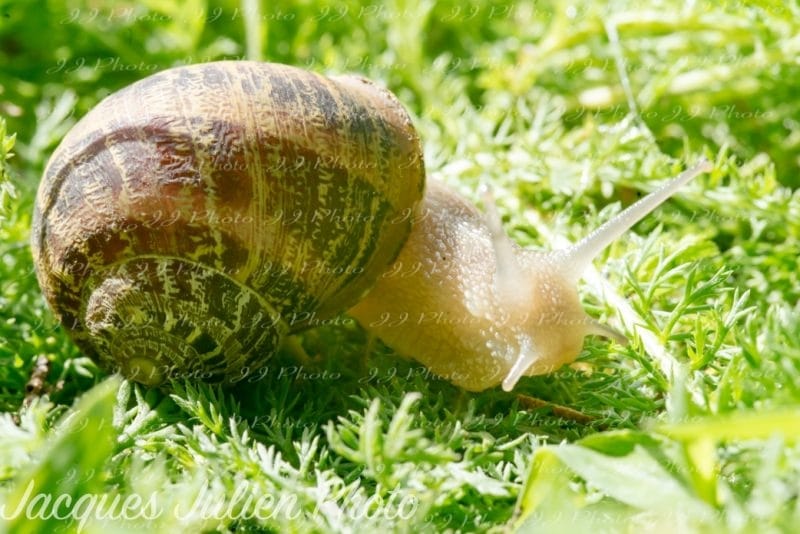Characteristic of the Cornu aspersum
Size: Smaller than the Burgundy snail (Helix pomatia) the garden snail (Helix aspersa) snail measures 25 to 35 mm by 25 to 40 mm for a weight of 7 to 15 g.
Shape, look: Like other land snails, the garden snail has eye tentacles with the eyes at the tip. Its limestone shell is very round, with 4.5 to 5 turns. The opening (peristome) is wide, with a white border.
Behaviour: It is a species whose activity is mainly nocturnal. It is a very widespread species, it is found in gardens, parks, woods, hedges, dunes.
Diet: On a vegetarian diet, this snail eats many plants, mainly nettles, but their effects on cultivated plants cannot be ignored.
Life expectancy : usually 3 to 5 years (max 10 years)
Reproduction
The European garden snail is hermaphroditic like other land snails. During mating, there is cross-fertilisation. The laying then takes place in a hole in the ground 4 to 8 cm deep. The number of eggs laid is around 85, they are white with a diameter of about 3 mm. Hatching will take place after 12 to 25 days depending on the temperature. The development is direct, it is therefore small snails similar to adults in miniature that will hatch.
There are several subspecies of Helix aspersa in Europe. Because of its gustatory value, this snail has been the subject of breeding in a controlled environment, the heliciculture, it is the Algerian subspecies, Helix aspersa maxima (the “big gray”) which has today the favour of the breeders.
Behaviour
Garden snails are known for their very slow movement which gives them their reputation as a calm and peaceful animal. They move by crawling on a thin layer of mucus that they secrete to reduce friction with the surface they slide on.
These snails are primarily nocturnal, meaning they are most active at night. During the day, they usually hide under leaves, stones or in shady places to avoid heat and desiccation.
Because in fact they are sensitive to drought. They need constant humidity to survive and are therefore more active in humid weather. The mucus they secrete also helps keep their skin moist. they are also sensitive to air pollutants and chemicals.
During winter or bad environmental conditions, they go into hibernation. They retreat into their shell, seal the opening with a cover of dry mucus, and dramatically slow their metabolism to survive the harsh conditions.
Often considered pests by gardeners due to their appetite for plants, they play an important role in the ecosystem by recycling organic matter by feeding on decaying plant debris.

Ethology and facts
Fascinatingly, snails are able to learn and apply new procedures to access food. When faced with a difficult-to-reach food source, they have been observed to manipulate their environment or take advantage of unique opportunities. This ingenuity reveals a degree of intelligence that allows them to survive effectively and maintain the existence of their species.
An interesting fact about the garden snail is that it has the ability to repair itself if its shell is damaged. Its shell is made of a hard calcium-based material called chitin, which is produced by cells in the snail’s body. When the shell is damaged, the snail can secrete a special mucus that solidifies into a new layer of chitin, helping to repair the damage. This process can take several weeks or even months depending on the extent of the damage.
Symbolism
The snail is universally considered a lunar animal which, like it, appears and disappears in cycles.
In many ancient cultures, snails were considered symbols of fertility and periodic regeneration as it emerges from its shell in spring or after periods of rain. They were also often associated with the cycle of earth and life, death and rebirth.
As with the shell, the snail also evokes a symbolism of fertility and sexuality (by analogy with the vulva, drool, etc.). Among the Aztecs, it represented conception, pregnancy and childbirth.
In Egyptian hieroglyphs, the spiral is represented by snails which symbolize the evolution of life.
It is also associated with the modesty because it is carrying his house (and therefore everything one owns) with him.
Nowadays, it is mostly used as a symbol of slowness in various contexts. For environmental protection, it is considered a symbol of the delicate balance of nature and the need for protection due to its hypersensitivity to atmospheric pollutants. It has also been used as a symbol of the slow and steady progress of social and political change.


